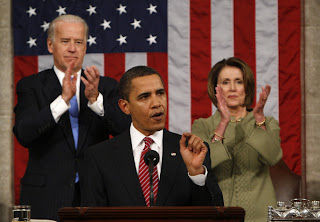...a comprehensive energy and climate bill with incentives that will finally make clean energy the profitable kind of energy in America.An interesting rationale considering the amount of clean energy development already happening. Even with the wretched economy of 2009, the US added more wind power capacity last year than ever, and the country now leads the world. Lots of money is already being made in clean energy.
A "comprehensive clean energy and climate bill" needs to do two things:
- Boost funding for clean tech development.
Many promising clean tech and clean energy innovations are gasping for the capital to reach fruition. Banks are still not lending, and the startup investment ecosystem has yet to fully recover. The gob-smacked economy is holding everything back. - Put a price on carbon.
Whether it's by a carbon tax, cap-and-trade, cap-and-dividend or something else, the practice of allowing any company or other interest to externalize some of its costs into the environment, onto our commons, must stop.
I am grateful to the House for passing such a bill last year. This year, I am eager to help advance the bipartisan effort in the Senate.
Amazingly, there are actually glimmers of bipartisanship in the Senate, an occurrence rarer than a blue moon. Senator Lindsey Graham (R-SC) has broken with his caucus to work towards real legislation:
In this area, the opportunity exists this year, in a bipartisan fashion, to get something...Graham doesn't much care for the Waxman-Markey bill passed by the House last year and thinks anything modeled on that has no chance of gaining the 60 votes apparently now needed by the Senate to pass anything:
"There will never be 60 votes for climate change legislation as it exists today," Graham told a forum on clean energy, jobs and security. "And it would be a shame if that is the end of the story."Such a contrast to the obstinacy of his fellow Republicans. Senator Lisa Murkowski (R-AK) has tried to strip the EPA of its power to act, complaining that only Congress should wield such authority. Yet she makes no effort whatsoever to work constructively with Graham or with Senators Maria Cantwell (D-WA) and Olympia Snowe (R-ME) who have proposed an innovative alternative with the CLEAR Act. We also don't see her coming up with any proposals of her own even as she lies about those of others. Meanwhile, Senator Ben Nelson (D-NE) has tied himself in verbal knots trying to avoid whatever his real reasons, likely political, to oppose action. The House also has its Do-Nothing caucus on climate and energy.
Obama recognized the challenge in getting a bill through Congress, and concluded his appeal for a climate and energy bill with perhaps the most forceful rhetoric of his 70-minute address:
I know there have been questions about whether we can afford such changes in a tough economy; and I know that there are those who disagree with the overwhelming scientific evidence on climate change. But even if you doubt the evidence, providing incentives for energy efficiency and clean energy are the right thing to do for our future – because the nation that leads the clean energy economy will be the nation that leads the global economy. And America must be that nation. [emphasis added]From the other side of the aisle Graham agreed that doing nothing would cost America "the most exciting economic opportunity of the 21st century -- the green economy." A few days later he was even more blunt in pushing back against the energy-only "half-assed" approach urged by other Senators:
It's the 'kick the can down the road' approach. It's putting off to another Congress what really needs to be done comprehensively. I don't think you'll ever have energy independence the way I want until you start dealing with carbon pollution and pricing carbon. The two are interconnected.There are enough voices of sanity in the Senate to get a real bill done, but in an election year will they put the urgent needs of the country first ahead of their personal political ambitions and the desires of their contributors?
UPDATE: fixed formatting and other blogger glitches








No comments:
Post a Comment